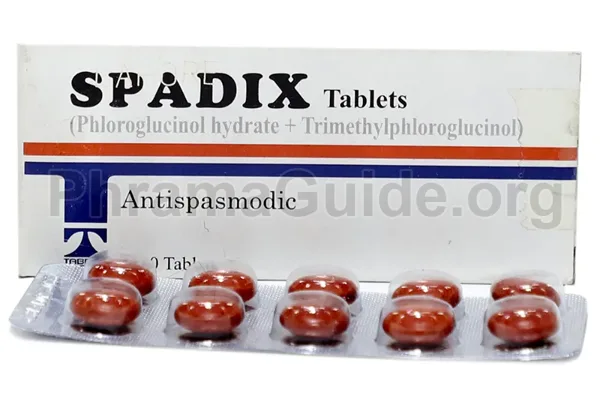Spadix is a combination of (Phloroglucinol and Trimethylphloroglucinol) often used to relieve gastrointestinal and urinary tract spasms. Here are common and less common side effects associated with Spadix.
Common Side Effects
- Nausea: Nausea is a relatively common side effect of Spadix. Taking the medication with food or after meals may help alleviate this symptom.
- Vomiting: Some people may experience vomiting while taking Spadix.
- Dizziness: Dizziness is a common side effect and can be more pronounced when you stand up quickly. It’s advisable to rise slowly from a sitting or lying position to minimize this effect.
- Headache: Headache is another common side effect of Spadix, and can be bothersome for some individuals.
- Rash or Skin Allergies: Skin rashes or allergic reactions are less common but can occur with Spadix. If you experience any skin reactions, such as itching, hives, or a rash, discontinue the medication and contact your healthcare provider.
Less Common Side Effects
- Hypotension (Low Blood Pressure): In some cases, Spadix can lead to a drop in blood pressure, causing symptoms like dizziness, fainting, or light-headedness.
- Allergic Reactions: While rare, severe allergic reaction is possible with Spadix, It can include symptoms like swelling of the face, tongue, or throat, difficulty breathing, and severe itching.
- Gastrointestinal Disturbances: Less common gastrointestinal side effects of Spadix can include abdominal pain, diarrhea, and constipation.
- Hypersensitivity Reactions: In rare instances, some individuals may develop hypersensitivity reactions, which can involve symptoms like fever, joint pain, and inflammation.
- Palpitations: Some individuals may experience palpitations or an irregular heartbeat while taking Spadix. If you notice any heart-related symptoms, contact your healthcare provider.
- Liver Problems: Very rarely, liver problems, such as elevated liver enzymes or hepatitis, have been reported with the use of Spadix.
- Changes in Urine Color: Some individuals may notice changes in the color of their urine (e.g., it may appear green) when taking Spadix. This is typically harmless but should be discussed with your healthcare provider if it concerns you.

What is Spadix?
Spadix is one of the leading brands of Phloroglucinol and Trimethylphloroglucinol, manufactured and marketed by Tabros Pharmaceuticals, Pakistan.
Spadix : Available Formulations and Strengths
Presently, Spadix is available in Tablet and Injection Forms
Spadix Tablet : Phloroglucinol 80mg, and Trimethylphloroglucinol 0.08mg strengths
Spadix Injection : Phloroglucinol 40mg, and Trimethylphloroglucinol 0.04mg strengths
What Are The Possible Drug Interactions of Spadix?
- Anticholinergic Medications: Spadix may have anticholinergic effects. Combining it with other medications with similar effects, such as antihistamines, tricyclic antidepressants, or antipsychotic drugs, can increase the risk of anticholinergic side effects like dry mouth, constipation, blurred vision, and urinary retention.
- Alcohol: Alcohol can increase the sedative effects of Spadix, potentially leading to excessive drowsiness or impaired coordination. It is advisable to avoid alcohol while taking these medications.
- Central Nervous System Depressants: Combining Spadix with other central nervous system depressants, such as benzodiazepines, opioids, or muscle relaxants, can increase the risk of excessive sedation and impaired cognitive function.
- Hypotensive (Blood Pressure-Lowering) Medications: Spadix can cause a drop in blood pressure. Combining them with other blood pressure-lowering medications may lead to excessively low blood pressure. It’s important to use caution and monitor blood pressure if you are prescribed both types of drugs.
- Hypertensive (Blood Pressure-Elevating) Medications: Spadix can potentially interact with medications that increase blood pressure. Their use in combination may lead to a loss of the blood pressure-lowering effects of these medications.
- Liver Enzyme Inducers/Inhibitors: Some medications can either induce or inhibit liver enzymes responsible for breaking down drugs in the body. This can potentially affect the metabolism of Spadix. The clinical significance of these interactions may vary.
- Medications Affecting Urinary Function: Since Spadix is used for urinary tract spasms, combining them with other medications affecting urinary function, such as diuretics or medications for urinary retention, may result in complex effects on the urinary system.

Leave A Comment